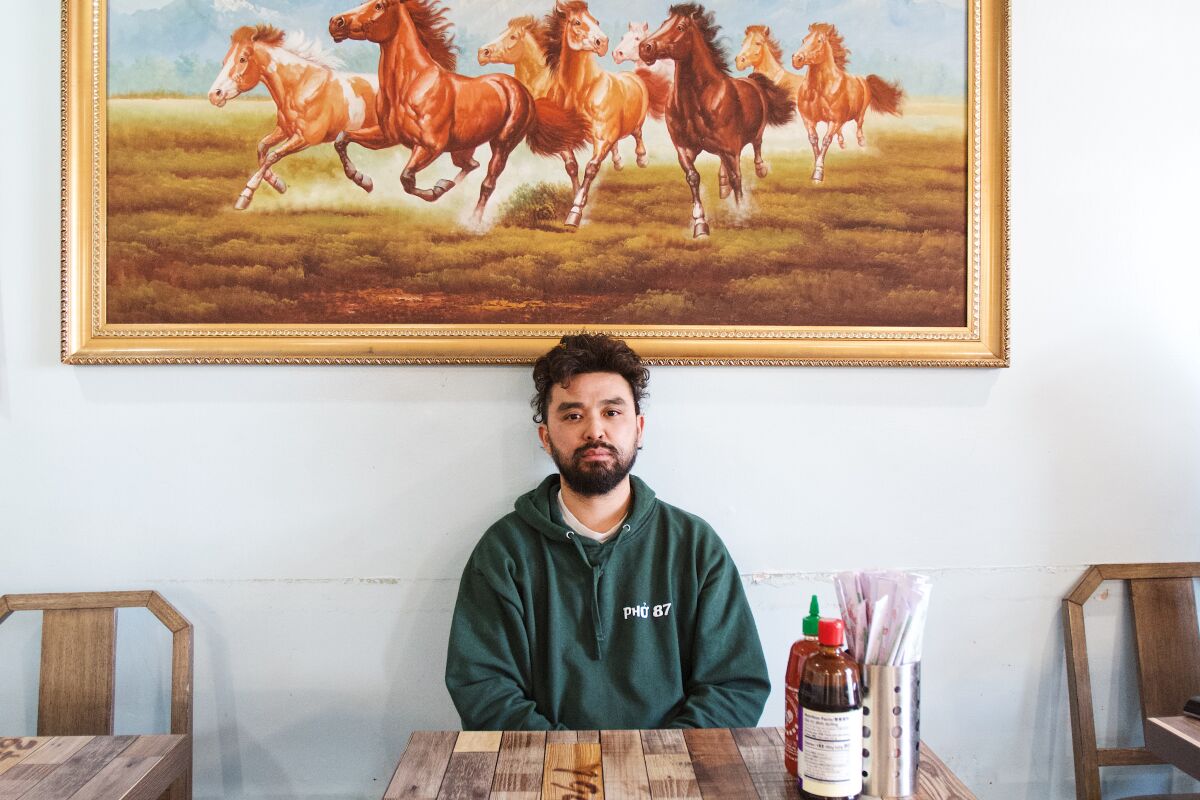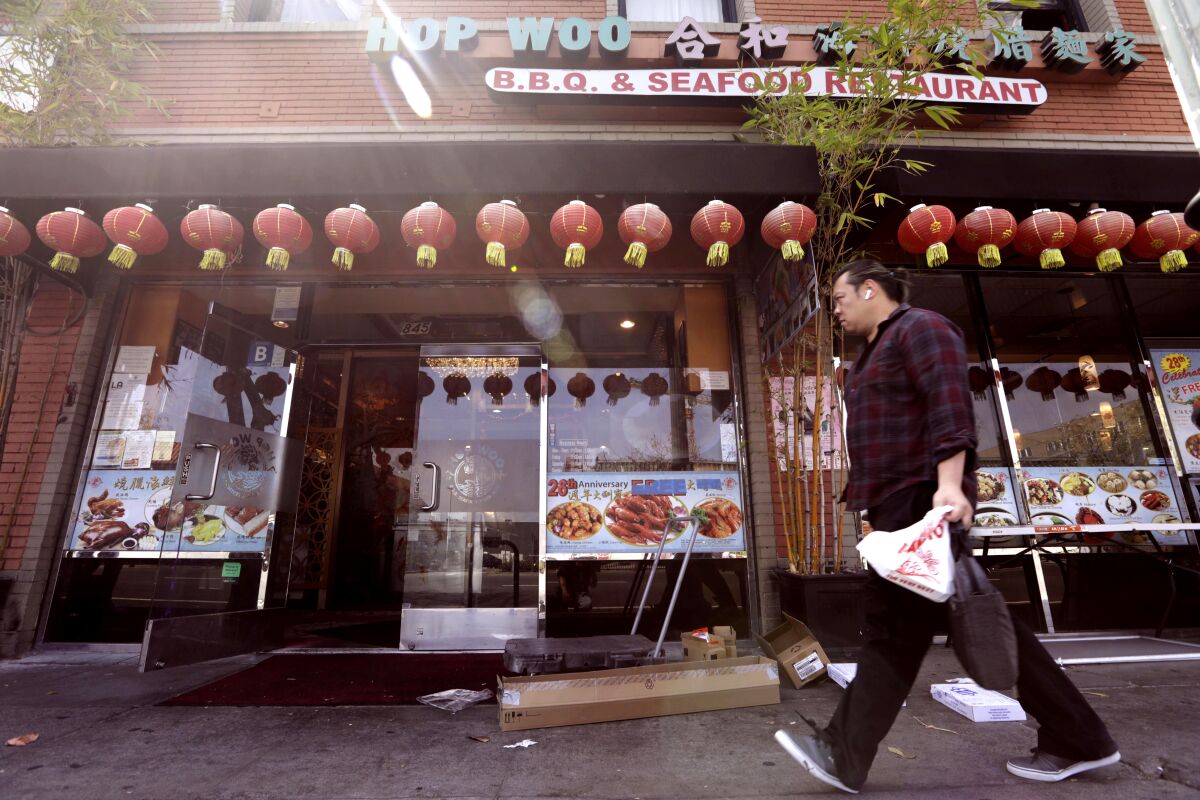The key to Vietnamese restaurant Pho 87’s signature soup — 16 to 20 hours of simmering on the stove — proved catastrophic this month. When owner Tre Dinh opened his gas bill for January, it was more than $8,000.
In December the Chinatown restaurant’s gas bill was roughly $800 for November usage, according to Dinh. The bill he received in January leapt to around $2,000, but even knowing another price increase was coming didn’t prepare the restaurant owner for the bill he received in February. He’s one of countless restaurateurs who received a sky-high January gas bill, credited largely to the wholesale cost of natural gas hitting record highs.
The ripple effect is being felt through the homes and businesses of Southern California Gas Co.’s 21.8 million customers, with Pacific Gas & Electric also estimating high gas bills for Central and Northern California this winter. Businesses that require gas cooking methods — such as tabletop Korean barbecues, wok stations, and gas-powered stoves and ovens — are now costing restaurateurs thousands of dollars more than their typical expenses, causing some owners to consider closing temporarily or raising prices to offset the charges. Adding to existing concerns over inflation, supply-chain difficulties and labor costs, some feel helpless.
“It just doesn’t end,” said Paul Cao, the chef-owner of Irvine restaurant Burnt Crumbs. “When are we going to get relief?”
Dinh is planning to take action.
“I’m writing a petition or something. I want to fight the city, fight the gas company, because this is impossible.” he said. “I’m not just worried about us. I’m worried about the whole community.”
Dinh, whose parents opened the pho shop in 1987 and who took over in 2018, is calling on aid for businesses struggling with their gas bills. In a bid to help other restaurants in Chinatown, Dinh has changed his years-long practice of eating in his own restaurant multiple times a day and patronizing other spots in the neighborhood two or three times a week; recently he’s begun eating one meal at Pho 87 and one meal at a nearby restaurant each day. As he’s made his way through multiple restaurants, he hears the same: Everyone has been hit by these gas prices, and all need support.

Pho 87 serves a range of pho, including its popular charred-pork variety, with broths simmering for a minimum of 16 hours. To offset the latest gas bill, ownership is expecting to raise its prices by at least $1.
(Stephanie Breijo / Los Angeles Times)
“If you go out and eat — even spend like $3 on a sandwich or something — it just gives everybody hope that their community is there to back them up,” he said.
Should gas prices remain comparable or increase again, Dinh is considering closing the restaurant for a month in the spring. A cold-weather staple, the pho shop typically sees a decline in business as the weather warms up; L.A.’s current cold snap is keeping the restaurant busier than average for February, but March and April often mark the shop’s annual slow period. Another $8,000 gas bill would not be worth the operating costs, Dinh said. It would also be a choice that makes a statement.
“We have to stand up for ourselves and what we believe in,” Dinh said. “If we keep opening and paying, they won’t feel like it’s affecting anyone. We can keep it open, but we won’t be making any money. They will be making money.” Should he close for a month, however, he’ll hurt his employees’ paychecks; he’s being put in a difficult situation, he said.
SoCalGas has stated that the company does not profit from rising natural gas costs.
Fortunately for Dinh, February’s prices are set to decrease and the bill he receives in early March should be more manageable, according to Southern California Gas Co. February prices per therm should drop 68% from January — still up from what customers paid in December 2022 and still higher than usual for February, historically, according to one SoCalGas executive, but a decline from last month’s dramatic jump in cost.
Regardless of whether he’ll temporarily shutter the restaurant, Dinh knows he has to raise prices. Surrounded by notes, signed jerseys and sketches from his customers, he says he is just as concerned for Pho 87’s fans as he is for the local restaurant community. Passing costs on to guests is a difficult choice for the owner to make; he knows they’re all receiving high gas bills at home, too. Traditionally his family raises prices by 25 cents each year; given Pho 87’s latest gas bill, he concedes he’ll have to raise them $1 to $1.50 for entrees, and he just hopes that his customers will understand.

Tre Dinh, owner of Pho 87, grew up in his parents’ restaurant before taking over in 2018.
(Stephanie Breijo / Los Angeles Times)
Three blocks away Chinese restaurant Hop Woo is struggling with an even larger gas bill.
On Feb. 9 the Liang family behind the long-running barbecue specialist opened their gas bill and saw a shocking figure: $13,656.25. The therm rate had jumped from a cost of $1.05 per unit in December to a whopping $3.45 in January, sending the owners of the restaurant — which relies on gas stoves for its wok-fired menu and oven-roasted barbecued meats — into a panic.
“I was just in shock,” said Mary Liang. “I had to do a double take.”
At first they thought it was an error; maybe someone had forgotten to pay a previous month’s bill, resulting in past-due amounts tacked on to their current statement. This wasn’t the case, and the massive financial setback compounded years of difficulties that not only included pandemic-spurred rent backlogs, which the family is still paying off, but also the death of their patriarch and the chef-founder.
Liang’s parents founded Hop Woo in 1993. After the 2022 death of chef Yening “Lupe” Liang — famed for instating an innovative trilingual menu at the restaurant — the restaurant has been run primarily by matriarch and co-founder Judy Liang with help from her daughter, niece and other family members. The setbacks have felt relentless.
Mary Liang said the restaurant’s previous bills cost roughly $5,000 to $6,000 per month. They’ve been told that their next bill should be much lower, but that doesn’t provide much peace of mind. “It’s very uncertain because it can go up any time,” she said. “So even if it’s lower for this next month, we never know if it’s gonna go up again in the future.”
Should another bill of that amount arrive, Liang says the cost of operating would be unsustainable. For now, the family has arranged a payment plan with SoCalGas to pay the amount due over the course of four months; after KCRW “Good Food” host Evan Kleiman shared a photo of Hop Woo’s bill on Instagram, Liang says contributions began trickling in through the restaurant’s COVID-era GoFundMe page. Liang says they’ve raised roughly $2,000 toward their gas bill and that every bit helps, including a simple takeout order.

Hop Woo, in Chinatown, received a gas bill for $13,656.25. The family is raising funds to offset the high cost via a GoFundMe page.
(Genaro Molina/Los Angeles Times)
The high January gas bills extend far beyond Los Angeles.
Paul Cao, executive chef-owner of Burnt Crumbs in Irvine, said he had steeled himself for a cost bump after he heard about the impending gas prices. In December his restaurant’s gas bill was about $700 — relatively on average. In January, it increased to roughly $1,000. When he opened his bill in February, the amount had spiked to $1,626.
Like the Liangs, Cao said his enormous gas bill is piggybacking on nonstop hits his restaurant has endured: After years of operating during the pandemic, he had to contend with high labor costs because of a worker shortage. Supply chain issues and high food prices came next. Then egg prices skyrocketed.
Before COVID-19 he owned three bricks-and-mortar restaurants. Now it’s just Burnt Crumbs — a popular brunch spot known for gourmet sandwiches — and his two food trucks. Like Dinh, he’s had to pass some of those costs on to consumers: Before the pandemic his sandwiches cost about $10. Now they run $12.50 to $13. He doesn’t know what he’ll do if gas prices keep climbing.
“We can’t be selling $25 sandwiches,” Cao said. Unlike corporate-owned restaurants, Cao and other proprietors say smaller restaurants like theirs don’t have the flexibility to weather such dramatic changes. “If they keep increasing gas prices by 60% every month, we are not going to last,” Cao said.
For those who rely on gas for pizza ovens, the cost is especially unavoidable.
The gas bills soared by an average of $400 at Terrace by Mix Mix, where chef-owner Ross Pangilinan serves seasonal pizzas and hearth-fired shareable plates within Costa Mesa’s South Coast Plaza. Pangilinan also owns ReMix Kitchen Bar in Long Beach and is an owner of Populaire — a modern Cal-French bistro also in South Coast Plaza — but said the gas bill particularly spiked at Terrace because of the kitchen’s gas-powered pizza oven.
“I’m not going to stop making pizzas,” he said. “We’re just going to have to look at our menu and see where we can increase prices while still giving value.”
Gas costs more than doubled — from $700 to $1,800 a month — at Breezy in San Juan Capistrano, but raising menu prices right now isn’t an option for Jasmin Gonzalez, co-owner of the Pacific Islander-inspired brunch spot. Her restaurant only just opened in November, and it would be “detrimental” at this point, she said.
“I can’t do that to our customers. When you gain the trust of customers in your community, as soon as you change something, it will mess it up,” Gonzalez said. “Right now, I’m just going to have to eat it.”
Gonzalez, also co-owner of Primal Cut in Stanton, said she’s curious to see what next month’s gas bill will look like. If the gas bills continue at this pace, she said she’ll eventually have to raise prices in the summer.
“I really won’t have a choice,” she said. “At some point something has to give.”
For all the latest Life Style News Click Here
For the latest news and updates, follow us on Google News.
